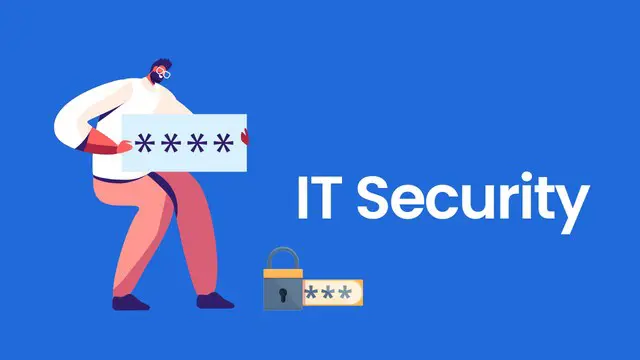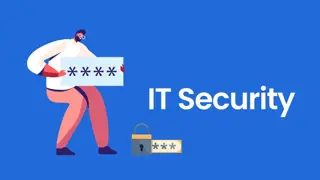
IT Security Training Course - CPD Certified
CPD Certified| Free PDF Certificate | Lifetime Access | Learner Support | No Hidden Fees | 100% Success Rate
EDURISE
Summary
- Certificate of completion - Free
- Reed courses certificate of completion - Free
- Tutor is available to students
Add to basket or enquire
Overview
Are you concerned about the increasing threats to data and information security in today's digital age? With cyberattacks on the rise, IT security has become a critical component for businesses and organizations. In this era of evolving technology, safeguarding sensitive data is of paramount importance.
IT Security Training - Protecting the Digital World
Our comprehensive IT Security Training program is designed to equip you with the knowledge and skills needed to defend against cyber threats, secure information systems, and contribute to the safety of the digital landscape.
Why IT Security Matters
Cybersecurity Threats Are On the Rise: With the increasing use of technology, cyberattacks are becoming more frequent and sophisticated. IT security professionals are in high demand to protect against these threats.
Protect Your Business: As a business owner or manager, keeping your company's data secure is not just an option, but a necessity. IT security training can help you safeguard your organization against potential breaches.
Data Privacy Regulations: Many countries have enacted stringent data protection regulations. IT security experts are needed to ensure compliance and avoid hefty fines.
Career Opportunities: The field of IT security offers diverse career paths, ranging from ethical hacking to security analysis. Skilled professionals in this field are highly sought after.
Constant Learning: Technology is constantly evolving, and staying updated with the latest threats and solutions is essential. Our course keeps you informed about the latest trends and strategies.
Course Highlights
Module 1: Introduction to Cybersecurity: Understand the fundamentals of IT security and the significance of protecting data.
Module 2: Threat Landscape: Explore the various types of threats, from malware to social engineering.
Module 3: Security Measures: Learn about encryption, firewalls, and other tools to secure data.
Module 4: Risk Assessment: Understand how to identify vulnerabilities and assess potential risks.
Module 5: Incident Response: Discover strategies to respond to and recover from security incidents.
Who Should Enroll?
Business Owners and Managers: Secure your company's data and protect your reputation.
IT Professionals: Enhance your skills and career prospects in this high-demand field.
Students and Graduates: Start a career in IT security with a solid foundation of knowledge.
Anyone Concerned About Data Security: Gain essential knowledge to protect your personal and professional digital presence.
The digital world is full of risks, but with the right training, you can be part of the solution. Join our IT Security Training program today and help build a safer digital future.
Free Gift
- Course Completion PDF Certificate
- Tutor Support
Certificates
Certificate of completion
Digital certificate - Included
Reed courses certificate of completion
Digital certificate - Included
Will be downloadable when all lectures have been completed
Curriculum
Course media
Description
Learning Outcomes:
Chapter 1: Spam and Malware Upon completing Chapter 1, you will be able to:
Identify and Mitigate Spam: Recognize spam emails and understand strategies to minimize their impact on your inbox.
Understand Malware Threats: Comprehend various forms of malware, such as viruses, Trojans, and spyware, and implement protective measures.
Implement Antivirus Solutions: Learn how to choose, install, and maintain antivirus software to safeguard your system.
Chapter 2: Phishing and Viruses By the end of Chapter 2, you will have the skills to:
Recognize Phishing Attempts: Develop the ability to spot phishing emails and websites and avoid falling victim to fraudulent schemes.
Understand Virus Behavior: Gain insight into how viruses operate and propagate and apply measures to prevent infection.
Practice Safe Browsing: Apply best practices for secure web browsing and avoid malicious websites and downloads.
Chapter 3: Software Protection After finishing Chapter 3, you will be capable of:
Protecting Software: Learn about software vulnerabilities and how to secure your applications against exploitation.
Software Updates and Patching: Understand the significance of timely updates and patch management to prevent security breaches.
Data Backup and Recovery: Implement a data backup strategy and know how to recover from a software-related data loss.
This course empowers you to become proficient in safeguarding your digital environment against common threats and vulnerabilities, ensuring the security and integrity of your digital assets.
Certificate of Completion
After completing the IT Security diploma course, you will be able to obtain your free PDF certificate of course completion.
Who is this course for?
Ideal Audience:
Small Business Owners: Small business owners who need to protect their company's digital assets and confidential information from malware, phishing, and other cyber threats.
IT Professionals: IT specialists looking to enhance their knowledge of IT security to fortify their organization's digital infrastructure.
Non-Technical Individuals: People with limited technical backgrounds who want to improve their understanding of common online threats and how to protect themselves.
Parents and Guardians: Parents and guardians seeking to protect their family members from online threats and educate them about digital security.
Remote Workers: Individuals working remotely who need to ensure the security of their online activities while away from the corporate network.
General Internet Users: Anyone who uses the internet and wants to learn how to recognize and prevent spam, malware, phishing, and other security risks.
Entrepreneurs: Entrepreneurs launching online businesses who must secure their websites and applications against digital threats.
Senior Citizens: Elderly individuals who may not be well-versed in IT but need to stay safe from online scams and threats.
Educational Institutions: Schools and educational organizations looking to educate students and staff about IT security to protect sensitive data.
Human Resources Professionals: HR personnel responsible for training employees on cybersecurity measures and best practices.
This course caters to a broad audience seeking to understand and implement fundamental cybersecurity measures to safeguard their digital presence and data.
Requirements
The IT Security course has no formal entry requirements.
Career path
- IT Security Analyst: Entry-level position with a typical UK salary ranging from £25,000 to £40,000 per year.
- IT Security Specialist, Security Consultant: With experience and certifications, salary can advance to between £41,000 and £70,000 annually.
- Senior IT Security Manager, Chief Information Security Officer (CISO): Experienced professionals in these roles may earn £71,000 to £120,000 or more.
Questions and answers
Currently there are no Q&As for this course. Be the first to ask a question.
Reviews
Currently there are no reviews for this course. Be the first to leave a review.
Legal information
This course is advertised on reed.co.uk by the Course Provider, whose terms and conditions apply. Purchases are made directly from the Course Provider, and as such, content and materials are supplied by the Course Provider directly. Reed is acting as agent and not reseller in relation to this course. Reed's only responsibility is to facilitate your payment for the course. It is your responsibility to review and agree to the Course Provider's terms and conditions and satisfy yourself as to the suitability of the course you intend to purchase. Reed will not have any responsibility for the content of the course and/or associated materials.


